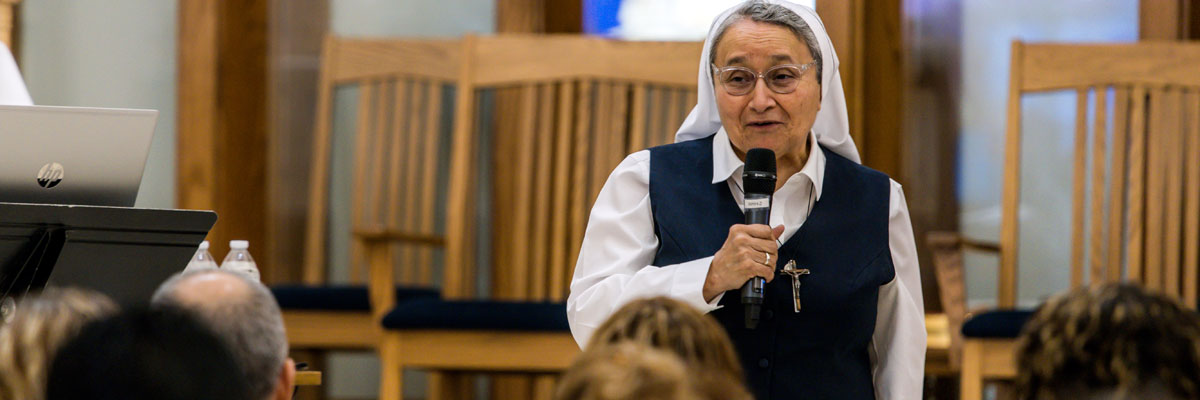Official Website of the
Catholic Diocese of Little Rock
2024 Consecration Day and Religious Jubilarian Mass
Published: February 3, 2024
Bishop Anthony B. Taylor preached the following homily at the Carmel of St. Teresa of Jesus Monastery in Little Rock on Saturday, Feb. 3, 2024. It is based on the following readings: Hebrews 13:15-17,20-21; Psalm 107:23-31; and Mark 4:35-41.

Bishop Taylor
There is no part of the world exempt from disasters. We have tornadoes, drought and most recently here in Arkansas, ice storms. Other places have hurricanes, earthquakes, tsunamis, volcanoes and mudslides, and these are just the natural disasters. The worst disasters are those caused by humans.
But as we see in the Scriptures, Jesus is more powerful than any disaster. In today's Gospel it is a natural disaster that threatens. His disciples had been fishermen and so they were very familiar with storms on the Sea of Galilee, but this storm was more than even they could handle, and they used boats for a living.
Jesus will not calm every storm because sometimes it is the storm itself that serves God's purposes. That's the mystery of the cross. Most of the disciples saved that day from drowning will one day die a martyr's death, perish in a different kind of storm, but a storm nonetheless.
But it wasn't more than Jesus could handle. When all hope seemed to be lost, he stood up and calmed the storm.
No person who lives long enough makes it through this life without eventually having to face storms too powerful for us to handle on our own — and you vowed religious, and we who are priests and bishops are in no way exempt from these storms of life. Some of these are personal disasters more devastating than anything nature could ever send our way.
Don't raise your hands, but how many of your have ever been through a stormy time in the life of your community when you felt misunderstood and misjudged and alone and powerless? ... at the mercy of the winds, so to speak. How many of you have someone you love who is mentally ill or addicted to drugs or alcohol?
How many of you have not-yet-healed, self-inflicted inner wounds caused by sins that you yourself committed and now regret bitterly? Have persistent remorse for something you did, maybe for broken relationships caused by your own betrayal of a friend or of your vows, even of your Lord?
How many still carry a load of anger over something your superior did in the past? Anger over members of your community who you grew to love, and who you expected to spend your whole life with who then just left, as if you and your community and the call of the Lord and your shared vision didn’t mean anything to them? These storms may have been irrational, but they can keep a person’s life in turmoil for years. Well, Jesus is more powerful than those storms too.
In today's Gospel Jesus was apparently so tired that it looked like he was going to just sleep right through the storm that was about to capsize their boat, so his disciples woke him, shouting: "Teacher, do you not care that we are perishing?" And as it turns out, not only did he care, but he was also able to do something about it.
He calmed that storm because calming that storm served God's purposes: His disciples discovered something new about Jesus. They were filled with great awe and said to one another, "Who then is this whom even the wind and sea obey?"
But Jesus will not calm every storm because sometimes it is the storm itself that serves God's purposes. That's the mystery of the cross. Most of the disciples saved that day from drowning will one day die a martyr's death, perish in a different kind of storm, but a storm nonetheless.
When we embrace suffering that serves God's purposes, the sacrifices we have to make may be very great and even tragic, but unlike other storms, these storms that are the price of faithfulness do not lead to disaster — far from it.
When you embrace with love whatever cross God has picked out specifically for you, that cross becomes redemptive — in your own life and in the lives of others. As we see in today's Gospel, sometimes it serves God's purposes to calm storms when we cry out to him for help.
But there are also plenty of other times when the storm itself serves God's purposes and faithfulness to him requires us simply to embrace that cross with love. In either event — when he calms the storms and when he doesn't — our attitude should be what we sang in today's responsorial psalm: "Give thanks to the Lord, his love is everlasting."




